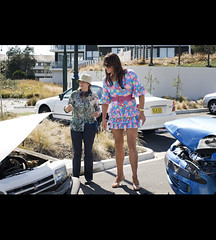Walking around through the new Museum of Australian Democracy in Old Parliament House makes me think that democracy can be hard work. It makes me remember standing outside an election booth on a hot day trying to hand out how-to-vote cards, when nobody was interested in taking them and the candidate had a snowflake's chance in hell of winning.
They were standard issue: party name and a bad photo of an uncomfortable candidate, an awkwardly smiling plumber friend of my father's. He wore his suit and good shirt and tie for the photo, and kept his Stubbies and work boots on. The photo had been taken during his lunch break in the billiards room of the RSL.
His motto was emblazoned across his humble face: "Put me to the test and I will do my best." Not much of a battle cry, we thought.
We had looked at his photo, my friend and I, for most of the morning and a good part of the afternoon. After a while we got bored, and started handing out handfuls to unsuspecting voters. We would stuff wads into handbags and shopping baskets. Fold them and roll them and tear them. Poke out the humble plumber's eyes. Flick them at each other like ninja stars we had seen in the lame martial arts movies at the old Bay Cinema in Scarborough.
We would treat the exercise with the lack of interest we thought the whole thing deserved. My father turned up. He'd been doing the rounds of the booths. He must have been watching us for a bit and seen what we had been up to.
"Give me those," he said when he appeared. He spoke without rancour or anger, he just said it. "Go on, bugger off to the beach, I'll hand them out."
I tried to protest. "There's no point, he won't win. Nobody wants them." My father just looked at me. "That's not the point, you droob. People have died so we could vote today you know, and this fella has put his hand up. They deserve better than a pair of gooses like you. Go on bugger off, I'll hand them out."
So we buggered off to the beach and he stood handing out cards for a man few would vote for. We laughed at the beach, for we couldn't really see the point.
Sometimes, it is hard to get anywhere near seeing it.
There are bound to be times in this country when a community is saddled with a dud government. At any level, federal, state or local, when the group of people elected to govern is simply not up to the task.
Sometimes they are hopeless, sometimes they get swallowed by events beyond their control, sometimes they are riddled with corruption, and most of the time it's because they are at the fag end of long incumbency and are tired and spin passes for policy and self-preservation passes for service.
That's when people tend to fall back on old cliches and pretend cynicism.
All politicians are self-serving and self-important. All major political parties are moribund and the system by which we Australians allow ourselves to be governed - or misgoverned - is flawed and favours a few.
It's easy to pretend to be cynical. It's also easy to believe that calamity is around every corner: if our economy is tanking one week, a pandemic is spreading the next.
Yet it is this feigned cynicism - shrugging the shoulders, saying believing in something is too hard and so nothing matters - that is the great pandemic.
The Museum of Australian Democracy shows us democracy isn't just about politics and that politics isn't just about politicians. Amazingly, it shows the visitor that politicians are, above all, people.
It shows people struggling to build a better life. It shows hopes and dreams. It shows centuries of revolutions and compassion and courage. Democracy is the most human of all forms of governance. Sometimes, it's too weak, too open to manipulation, and too likely to lose its way. But the democratic bottom line is simple and the most generous of things, it's hope.
Modern Australia is a young nation. Along the way we have acquired some baggage and some great achievements that we should take pride in, both of which tell us what has made this country, us, and our brand of democracy what we are.
When I walk around the halls of Old Parliament House, I begin to see my father's point. Not that he would always win, not that his party would win, but that he and people like him would have a go.
It was being put to the test and giving your best, even if that meant wearing Stubbies and work boots below your suit, good shirt and tie.
William McInnes is the chairman of the advisory council of the Museum of Australian Democracy, which opened on Saturday.



